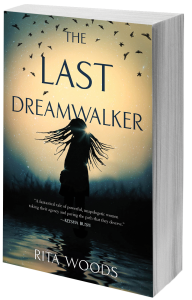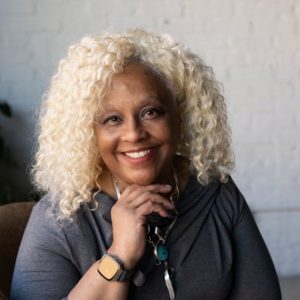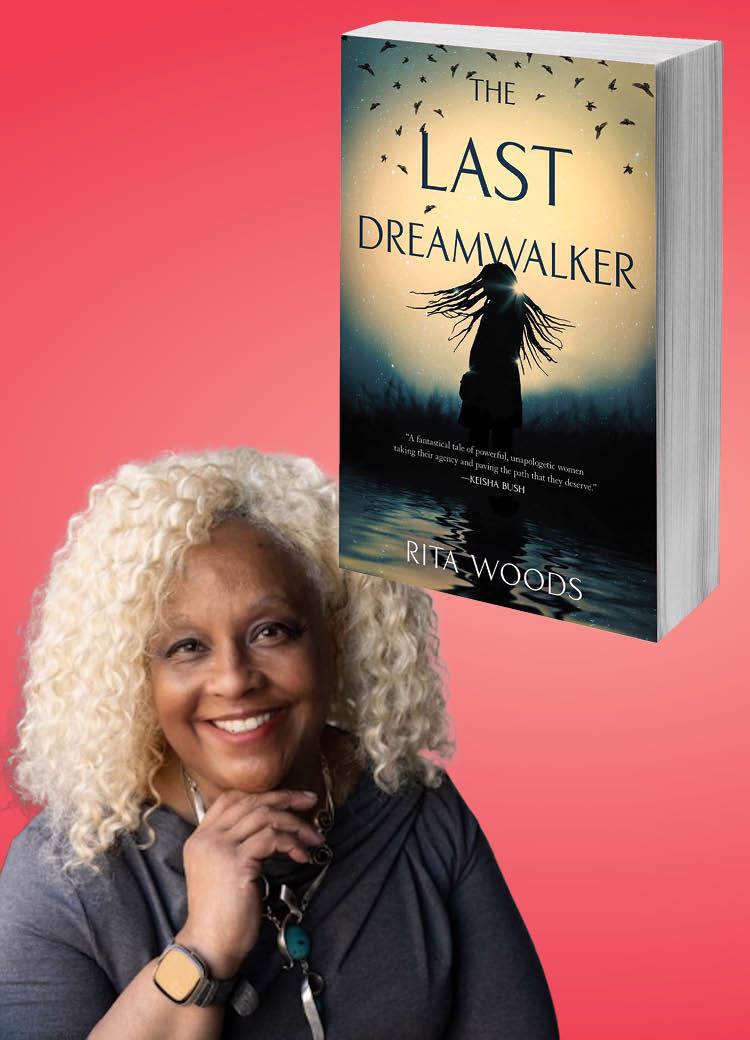Meet Afrofuturist Author Dr. Rita Woods
Have you heard of the Gullah Geechee people? I only learned about this fascinating piece of our cultural history recently, through the fiction of author Dr. Rita Woods. The Gullah Geechee are descendants of West and Central Africans who were enslaved and brought to the lower Atlantic states of North Carolina, South Carolina, Florida and Georgia to work on the coastal rice, Sea Island cotton and indigo plantations. They were able to retain more of their indigenous African culture than many enslaved Africans due to their isolated location on coastal plantations and islands. They also created a creole language called Gullah that is only spoken among the Gullah Geechee people.
Woods fiction highlights African American experiences
 In The Last Dreamwalker by Woods, a modern-day woman reconnects with her family heritage and her ties to Gullah Geechee women. She also discovers she has inherited the ability to inhabit and manipulate the dreams of others. Woods describes the book as “the story of the Gullah-Geechee people and by extension the story of Black people who took charge of their own futures, their own fates, and what that cost them.”
In The Last Dreamwalker by Woods, a modern-day woman reconnects with her family heritage and her ties to Gullah Geechee women. She also discovers she has inherited the ability to inhabit and manipulate the dreams of others. Woods describes the book as “the story of the Gullah-Geechee people and by extension the story of Black people who took charge of their own futures, their own fates, and what that cost them.”
Woods is the author of two novels, Remembrance< and The Last Dreamwalker. Both explore an African American experience in our country’s history with elements of magic and the supernatural. The author describes her work as Afrofuturism. I'm a fan of Afrofuturist authors Octavia Butler and Janelle Monae, so I was immediately intrigued.
Afrofuturism
Woods describes Afrofuturism as, “a genre (aesthetic) that takes Sci-Fi, fantasy, magical realism, historical fiction and looks at it through the lens of the African-American experience. It is a way to revise and re-imagine the world through our history, our traditions. Someone said, Afrofuturism is a way to say African-Americans will exist in the future. I would add that it also says we have always existed: past, present and future.”
 I asked Monique Pittman-Liu, a longtime member of the Topeka (KS) Chapter of The Links, Inc. to tell me why the group chose Dr. Rita Woods as a featured author. Her answer brought tears to my eyes.
I asked Monique Pittman-Liu, a longtime member of the Topeka (KS) Chapter of The Links, Inc. to tell me why the group chose Dr. Rita Woods as a featured author. Her answer brought tears to my eyes.
“When I read Dr. Woods second book
Exploring diversity as it relates to Blackness
The Topeka Links could also see that Afrofuturism is a unique vehicle for exploring diversity as it relates to Blackness. The group agreed that Black people are often seen as one and the same, though there is actually tremendous diversity.
“Some of us had read Woods books and became intrigued with the concepts behind Afrofuturism,” Pittman-Liu said. “The re-imagining, on our own terms, of our people in the future. Dr. Woods tapped into a truth we want to share: That the future is NOT absent Blackness. We are not 'going back' and we will not be annihilated. Woods' genius is apparent in The Last Dreamwalker, which we will be spotlighting on April 14 and 15. This gripping tale makes complex truths about Black identity and existence truly comprehensible. It is speculative, historical fiction at its best, and we invite everyone to come share in this rich diversity of thought. There's a reason why Woods was honored with the Zora Neale Hurston/Richard Wright Legacy Award in 2021.”
Dr. Rita Woods is an avid reader as well as a writer. Check out her recommendations for more Afrofuturist reads below, then read the full interview with Dr. Rita Woods.
Full Interview with Dr. Rita Woods
Give us your elevator pitch, please. In a few short lines, tell us why readers should check out The Last Dreamwalker.
The Last Dreamwalker is the story of a 20-something artists, living in the D.C. area who her entire life, has experienced extraordinarily vivid dreams. She often wakes with injuries she can’t explain, in the yards of strangers, or with memories and knowledge she can’t explain. When her mother, with whom she’s had a strained relationship dies, she reconnects with her mother’s family and discovers that she is descended from a long line of Gullah-Geechee woman, who have the ability to inhabit the dreams of others and manipulate them. As she tries to come to terms with the increasingly dark secrets of her family’s past, she finds herself caught up in a decades old feud, fought in the dangerous corridor of dreams.
The Last Dreamwalker explores the damage secrets kept in a family can wreak. How sometimes by trying to re-invent yourself, you run the risk of losing everything. But it’s also the story of the Gullah-Geechee people and by extension the story of Black people who took charge of their own futures, their own fates, and what that cost them.
You are described as an Afrofuturist novelist. How do you define Afrofuturism, and how does your work fit within that genre?
Afrofutrurism is a genre (aesthetic) that takes Sci-Fi, fantasy, magical realism, historical fiction and looks at it through the lens of the African-American experience. It is a way to revise and reimagine the world through our history, our traditions. Someone said, Afrofuturism is a way to say African-Americans will exist in the future. I would add that it also says we have always existed: past, present and future.
Briefly, who are the Gullah people? What was it about the Gullah that drew your interest?
There are a series of nearly 100 islands off the eastern coast of the United States stretching from North Carolina to Florida. The enslaved people brought from West Africa to raise rice and cotton on these islands were extremely isolated and have for hundreds of years, maintained much of their culture: food, music, worship and developed their own language. These are the Gullah-Geechee. The United States Congress declared them sovereign in 2012, much like the Native Americans.
I was visiting South Carolina on business years ago and heard Gullah spoken for the 1st time. I was fascinated (obsessed?) by the idea of this whole group of people that were part of and separate from the world. Who were they? How come I’d never heard of them? What was their world like and how had it come to be? There is magic in places like this.














